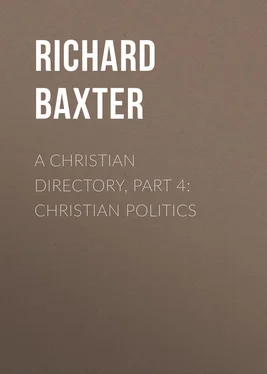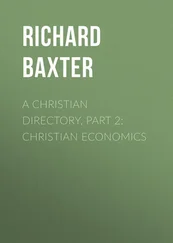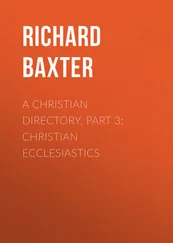Richard Baxter - A Christian Directory, Part 4 - Christian Politics
Здесь есть возможность читать онлайн «Richard Baxter - A Christian Directory, Part 4 - Christian Politics» — ознакомительный отрывок электронной книги совершенно бесплатно, а после прочтения отрывка купить полную версию. В некоторых случаях можно слушать аудио, скачать через торрент в формате fb2 и присутствует краткое содержание. Жанр: foreign_antique, foreign_prose, на английском языке. Описание произведения, (предисловие) а так же отзывы посетителей доступны на портале библиотеки ЛибКат.
- Название:A Christian Directory, Part 4: Christian Politics
- Автор:
- Жанр:
- Год:неизвестен
- ISBN:нет данных
- Рейтинг книги:3 / 5. Голосов: 1
-
Избранное:Добавить в избранное
- Отзывы:
-
Ваша оценка:
- 60
- 1
- 2
- 3
- 4
- 5
A Christian Directory, Part 4: Christian Politics: краткое содержание, описание и аннотация
Предлагаем к чтению аннотацию, описание, краткое содержание или предисловие (зависит от того, что написал сам автор книги «A Christian Directory, Part 4: Christian Politics»). Если вы не нашли необходимую информацию о книге — напишите в комментариях, мы постараемся отыскать её.
A Christian Directory, Part 4: Christian Politics — читать онлайн ознакомительный отрывок
Ниже представлен текст книги, разбитый по страницам. Система сохранения места последней прочитанной страницы, позволяет с удобством читать онлайн бесплатно книгу «A Christian Directory, Part 4: Christian Politics», без необходимости каждый раз заново искать на чём Вы остановились. Поставьте закладку, и сможете в любой момент перейти на страницу, на которой закончили чтение.
Интервал:
Закладка:
31
Quis mihi imponat necessitatem vel credendi quod nolim, vel quod velim non credendi. Lactant. lib. 5. c. 13.
32
Laert. in Solon, reciteth one of his sayings, Populi rector prius se quam populum recte instituere debet: si principes et majores secundum leges vixerint, unaquæque civitas optime rege peterit, p. 31.
33
Or spend thy time in them. Dr. Hammond.
34
Luke xviii. 22, 24; Deut. xvii. 20; Prov. xxix. 14; xxii. 29; xvi. 13; xxxi. 3, 4; 2 Chron. xxxii. 25; xx. 16; Ezek. xxviii. 2, 5, 17; Luke xii. 19, 20; xvi. 19, 20, 25. It is a sad observation of Acosta, lib. v. c. 9. p. 474. Ac reipsa ceutoque usu observatum est, eas Indorum nationes plures ac graviores superstitionis diabolicæ species teuuisse, in quibus regum ac reipublicæ maxime potentia et peritia excelluit. Contra qui tenuiorem fortunam minusque reipublicæ accommodata sortiti sunt, in his multo idololatria parcior est: usque adeo ut nonnullas Indorum gentes omni idolorum religione vacare, quidam pro certo confirment. Ex bonæ fidei scriptoribus super alias innumeras, hæc præcipua capitur utilitas; quod non alia res æque vel bonorum regum animos ad res cum laude gerendas accendit, vel tyrannorum cupiditates cohibet, ac refrænat, dum utrique cernunt horum literis suam vitam omnem, mox in totius orbis, imo sæculorum omnium theatrum producendam. Et quicquid in abdito nunc vel patrant, vel adscito fuco prætexunt, vel metu dissimulari cogunt, verius quam ignorari, paulo post clarissimam in lucem sub oculis omnium traducendum: quam jam metu pariter ac spe libera posteritas, nec ullo corrupta studio, magno consensu recte factis applaudet, parique libertate his diversa explodet, exibilabitque. Erasm. Præfat. in Sueton.
35
Euseb. in vita Const.
36
Nihil Deo qui omnem mundum hunc regit, acceptius, quam concilia cœcusque nominum quæ civitates appellantur. Cicero.
37
Grotius de Imper. Sum. Potest. c. i. p. 7, 8. Sunt qui objiciant reges quædam imperare non posse, nisi consensus ordinum accesserit: sed hi non vident quibus in locis id juris est, ibi summum imperium non esse penes reges, sed aut penes ordines, aut certe penes id corpus, quod rex et juncti constituunt, ut Bodinus, Suarezius, Victoria, aliique, aliunde demonstrarunt: certum summum imperium totum, et aliquid imperare non posse, ideo tantum quod alter vetet aut intercedat, plane sunt ἀσύστατα.
38
So foolish and bad is the multitude too often, that it made Aristippus hold it as probable, that a wise man should not endanger himself for his country, because wisdom is not to be cast away for the commodity of fools. Laert. in Aristip. But a wise man must be wise for others, and not only for himself.
39
It was one of the Roman laws of the twelve tables, Vendendi filium patri potestas esto. But this law rather giveth the father that power, than declareth it to be naturally in him. Nature alloweth him no other selling of him, than what is for his child's own good.
40
So p. 23. The same error of the original of power hath Acosta, 1. ii. c. 2. p. 208. with many other Jesuits and papists.
41
Bishop Andrews in Tortur. Tort. p. 385. Actuus homo non distinguit inter formam, atque authoritatem regiminis; forma de hominibus esse potest: de cœlo semper est authoritas. An rex sit supra leges, Vid. Seb. Fox. lib. ii. de Instit. Reg.
42
Dion Cass. saith, that when Euphates the philosopher would kill himself, Veniam dederat ei Adrianus citra ignominiam et infamiam, ut cicutam tum propter senectutem, tum etiam propter gravem morbum, bibere possit. In vita Adrian.
43
Against the people's being the givers of power, by conjoining all their own in one, in church or state, see Mr. D. Cawdry's Review of Mr. Hooker's Survey, p. 154, &c.
44
So lib. viii. p. 211, 218, 220.
45
Lib. viii. p. 195. Trita in scholis, neminem sibi imperare posse; neminem sibi legem posse dicere, a qua mutata voluntate nequeat recedere: summum ejus esse imperium qui ordinario jure derogare valeat. Et quibus evincitur jus summæ potestatis non limitari per legem positivum. Hinc et Augustinus dixit imperatorem non esse subjectum legibus suis. – Grotius de Imp. p. 149, 150.
46
Hanc video sapientissimorum fuisse sententiam. Legem nec hominum ingeniis excogitatam, nec scitum aliquod esse populorum; sed æternum quiddam, quod universum mundum regeret, imperandi prohibendique sapientia. Cicero de Leg.
47
How considerable a part of England is London! Yet in this convocation, which hath made the new changes in the liturgy and book of ordination, London had not one clerk of their choosing: for being to choose but two, they chose only Mr. Calamy and myself; who were neither of us accepted, or ever there. Now if your opinion be true; Quær. 1. Whether you make not this convocation's decrees to be but counsels to us? 2. Or at least whether the city of London, or the London ministers, be not made free from detriment, as not consenters? You will free them and me, especially from detriment for our not conforming to this convocation's acts as such; upon reasons which I do not own myself, as generally by you laid down.
48
Potestas maritalis est a Deo: applicatio ejus potestatis ad certam personam ex consensu venit quo tamen ipsum jus non datur. Nam si ex consensu daretur, posset consensu etiam dissolvi matrimonium, aut conveniri ne maritus fœminæ imperaret. Quod minime verum est. Imperatoria potestas non est penes electores: ergo nec ab ipsis datur; sed ab ipsis tamen certæ personæ applicatur. Jus vitæ et necis non est penes cives antequam in rempublicam coeant. Privatus enim jus vindictæ non habet: ab iisdem tamen applicatur ad cœtum aut personam aliquam. Grotius de Imperio, p. 270.
49
Greg. Nazianzen cited by Bilson of Subjection, p. 361. Thou reignest together with Christ; rulest with him; thy sword is from him; thou art the image of God.
50
Victor. Utic. saith of Victorianus proconsul of Carthage, that even to an Arian persecuting, usurping tyrant, Pro rebus sibi commissis semper fidelissimus habebatur; and the like of Sebastian and others, p. 460.
51
Mark vii. 10; x. 19.
52
Lamprid. saith of Alex. Severus that, Amavis literatos homines, vehementer eos etiam reformidans, nequid de se asperum scriberent. Universal. Histor. p. 132. Tiberius bellua luto et sanguine macerata; sui tegendi peritissimus artifex; totus tamen posteritatis oculis patuit, Deo hypocrisim detractione larvæ; plectente.
53
Matt. xviii. 6; Mark ix. 42; Luke xvii. 2; Jude 7-9.
54
Sext. Aurel. Victor, de Calig. De quo nescio an decuerit memoriæ prodi, nisi forte quia juvat de principibus nosse omnia, ut improbi saltem famæ metu talia declinent.
55
They are dangerous passages which Petrarch hath, though a good, learned, and moderate man. Dial. 49. Non tot passim essent domini nec tam late furerent, nisi populi insanirent et cuique civium pro se charior foret res privata quam publica; voluptas quam gloria, pecunia quam libertas, vita quam virtus – Et statim – Et sane si vel unum patria civem bonum habeat, malum dominum diutius non habebit. The meaning is too plain; abundance of the most learned writers have such passages which must be read with caution; though I would draw none to the other extreme. Petrarch's 68 Dial. and 85 Dial. de bono domino, is as smart as the former; but yet speaketh not all that contra reges, which he doth contra dominos. However he says that, Inter regem et tyrannum non discernunt Graii, &c. – So Sir Thomas More in his Poems: Regibus e multis regnum bene qui reget unum: vix tamen unus erit, si tamen unus erit. And that of Senec. Trag. ult. Tantum ut noceat, cupit esse potens. —
Читать дальшеИнтервал:
Закладка:
Похожие книги на «A Christian Directory, Part 4: Christian Politics»
Представляем Вашему вниманию похожие книги на «A Christian Directory, Part 4: Christian Politics» списком для выбора. Мы отобрали схожую по названию и смыслу литературу в надежде предоставить читателям больше вариантов отыскать новые, интересные, ещё непрочитанные произведения.
Обсуждение, отзывы о книге «A Christian Directory, Part 4: Christian Politics» и просто собственные мнения читателей. Оставьте ваши комментарии, напишите, что Вы думаете о произведении, его смысле или главных героях. Укажите что конкретно понравилось, а что нет, и почему Вы так считаете.












